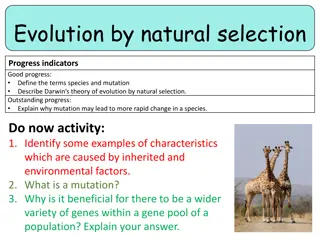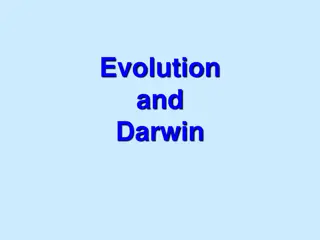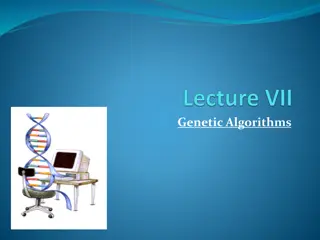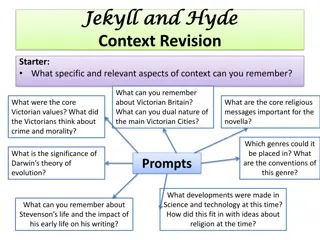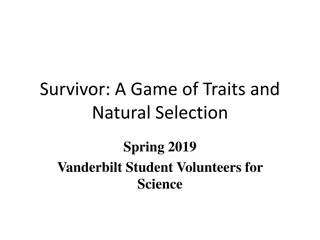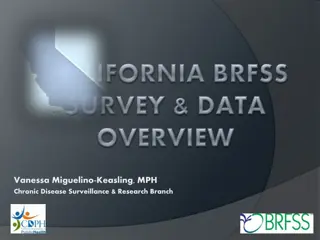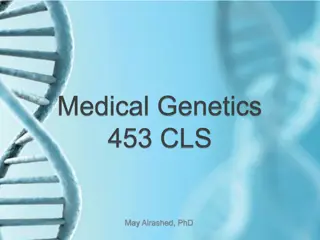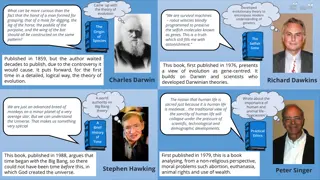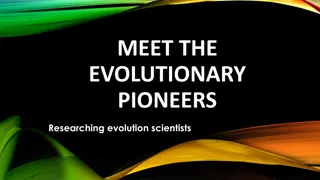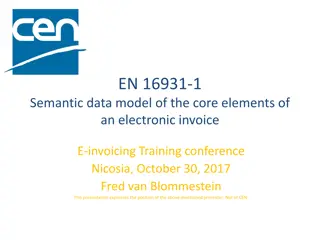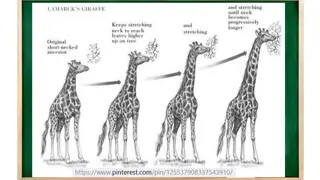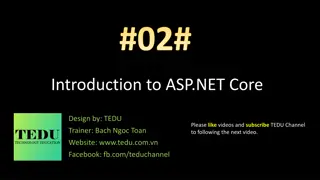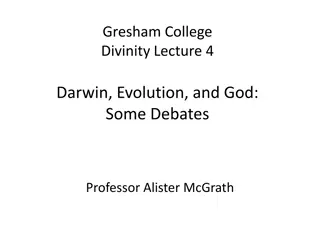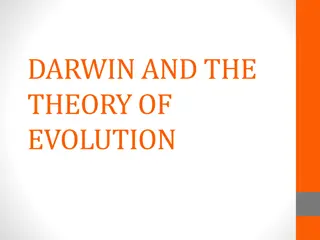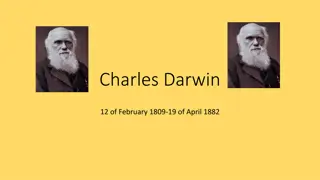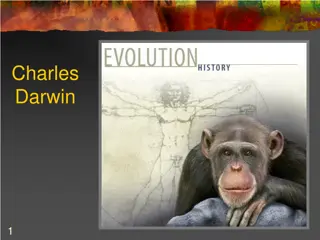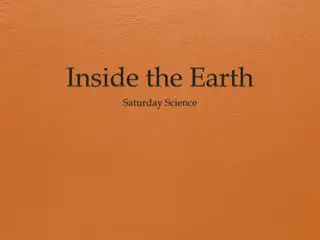Understanding Terrestrial Planets and Core Dynamics
Exploring the core-mantle interaction from the early Hadean period to present times reveals intriguing questions about the outer core's electrical conductivity, geodynamo sustainability, and inner core characteristics. Studies indicate challenges in maintaining the geodynamo, potential heat sources
9 views • 48 slides
Evolution and Plant Systematics Lecture Overview
This lecture outline delves into the concepts of evolution, unity, and diversity of organisms on Earth, covering topics such as fossils, Lamarck and Darwin's theories, adaptation, natural selection, artificial selection, Carolus Linnaeus' systematics, plant evolution, and the demonstration of evolut
5 views • 26 slides
Linguistics in the Second Half of the 19th Century: Schleicher, Psycholinguistics, Neogrammarian Theories
August Schleicher's biological approach to language, including his Stammbaumtheorie, aligned with Darwinian ideas prevalent in the 19th century. The origins of psycholinguistics can be traced back to Heymann Steinthal, who advanced the psychology of language. This period saw critical developments in
4 views • 22 slides
PTE Mastery: Unleashing Your Full Potential with Expert Coaching
Best PTE Coaching, The Most Trusted Institute for online PTE training course in Sydney, Melbourne, Perth, Brisbane, Canberra, Darwin
2 views • 2 slides
PTE Mastery: Unleashing Your Full Potential with Expert Coaching
Best PTE Coaching, The Most Trusted Institute for online PTE training course in Sydney, Melbourne, Perth, Brisbane, Canberra, Darwin
1 views • 2 slides
PTE Mastery: Unleashing Your Full Potential with Expert Coaching
Best PTE Coaching, The Most Trusted Institute for online PTE training course in Sydney, Melbourne, Perth, Brisbane, Canberra, Darwin
1 views • 2 slides
Exploring the Legacy of Gregor Mendel: Pioneer of Genetics
Gregor Mendel, an Austrian monk, revolutionized the understanding of heredity with his formulation of fundamental laws in the 1860s. Contrary to the prevailing blending theory of inheritance, Mendel's particulate theory explained species diversity and variation effectively. By meticulously conductin
2 views • 20 slides
Understanding Evolution by Natural Selection
Explore the concepts of species, mutation, Darwin's theory of evolution, and the role of genetic variation through mutations. Learn how mutations can lead to rapid changes in species and why a wider variety of genes in a gene pool benefits a population. Delve into the effects of mutations on individ
0 views • 15 slides
Evolutionary Theories and Discoveries in Biology
Explore the concepts of evolution and Darwin's contributions to the field of biology. From Lamarck's inheritance of acquired characteristics to Darwin's theory of natural selection, delve into the processes that have shaped life on Earth. Discover how Darwin's observations on the Galapagos Islands l
1 views • 44 slides
Exploring Darwin's Theory of Adaptation Through Finch Beaks
Explore the concept of adaptation through Charles Darwin's observations of finches' beak variations on different Galapagos islands. Discover how finches have evolved to match the size of seeds they eat and how their beak shapes differ based on their food sources. Learn about the significance of spec
0 views • 13 slides
Understanding Genetic Algorithms and Natural Selection
Genetic Algorithms (GAs) are based on Darwin's Principle of Natural Selection. Introduced in the 1960s, they use evolutionary computing to optimize solutions. The process mimics nature, where the best traits survive and propagate, leading to the evolution of species. Through examples like giraffes a
0 views • 75 slides
Evolutionary Journey of Early Humans
Explore the evolution of early humans, from the diverse species that lived over millions of years to Darwin's Theory of Evolution. Discover how natural selection shaped human ancestors and led to the development of modern humans. Uncover the significance of Africa as the cradle of civilization and t
0 views • 11 slides
Understanding Context in Jekyll and Hyde: Victorian Britain and Robert Louis Stevenson
Explore the social, economic, and moral landscape of Victorian Britain as reflected in Robert Louis Stevenson's life and novella, "Strange Case of Dr Jekyll and Mr Hyde." Delve into the dual nature of Victorian cities, core values, views on crime and morality, religious influences, and the significa
0 views • 12 slides
Explore the Science of Natural Selection and Traits
Dive into the fascinating world of natural selection and traits with a focus on how organisms adapt to their environments. Learn about the importance of Charles Darwin's theories, the role of traits influenced by genes and the environment, and how natural selection drives the survival of the fittest
4 views • 13 slides
Overview of BRFSS Survey and its Core Components
The Behavioral Risk Factor Surveillance System (BRFSS) is a state-based telephone survey that monitors personal health behaviors in non-institutionalized adults. It collaborates with the CDC and all 50 U.S. states to gather data on various health topics. The survey includes fixed core questions on d
0 views • 18 slides
Overview of CUPE Local 3550's Response to Anti-Union Legislation
A detailed overview of Bill 32, an anti-union legislation affecting Canadian Union of Public Employees (CUPE) Local 3550, which requires categorization of dues into core and non-core, with members opting in for non-core spending. The local has reviewed its budget, confirming it is 100% core, and emp
0 views • 14 slides
Recertification and Assessment of Core Curriculum Courses
The Core Curriculum Council of the Faculty Senate presents a process for recertification and assessment of core curriculum courses to maintain integrity and quality. Courses must be recertified every four years to ensure consistency amidst changes in instructors, content, and teaching methods. State
0 views • 33 slides
Enhancing Alignment Between Introductory Biology and Core Courses
Explore the alignment of the Biology core curriculum, focusing on the structure, goals, and rationale behind flipping portions of the curriculum. Evaluate the preparedness of students for core courses, identify gaps, redundancies, and essential knowledge transfer. Study design involves categorizing
0 views • 25 slides
Evolutionary Contributions of Prominent Scientists in the 19th Century
Charles Darwin, Gregor Mendel, Friedrich Miescher, Aristotle, and Carl Linnaeus were key figures in the 19th century who made significant contributions to the fields of evolution, genetics, DNA discovery, and taxonomy. Darwin proposed the theory of evolution and natural selection, Mendel established
0 views • 20 slides
Analysis of Seasonal Variations in Gulf Plains Convective Cores
The analysis reveals fascinating insights into Gulf Plains convective cores, showcasing variations in core numbers, average pixels per storm, pixels per core, and core sizes across different seasons. Deep-Wide cores dominate in the summer, while Gulf cores are larger in the fall. The study sheds lig
1 views • 4 slides
Evolutionary Theories and Advocates Explained
The theory of evolution, proposed by Charles Darwin and further developed by Richard Dawkins, explores the origins of species and the genetic basis of life. Darwin's groundbreaking work laid the foundation for modern understanding of genetics, while Dawkins challenged religious beliefs with his conc
1 views • 5 slides
Evolutionary Pioneers: Anning, Darwin, Wallace - Key Figures in Evolutionary Theory
Meet the evolutionary pioneers - Mary Anning, Charles Darwin, and Alfred Russel Wallace, who played crucial roles in the development of evolutionary theory. Learn about their groundbreaking discoveries, challenges faced, and lasting impact on the scientific community.
0 views • 7 slides
Achieving Mission Fulfillment Through Core Themes: An Update
In 2016, our college established four core themes to represent its mission at the core. These themes - Academic Transfer, Career & Technical Education, Essential Skills, and Lifelong Learning - serve as indicators to gauge our progress towards fulfilling our mission. Currently, we are performing abo
0 views • 18 slides
Semantic Data Model of Electronic Invoicing Core Elements
Presentation by Fred van Blommestein on the EN16931-1 semantic data model of core elements in electronic invoicing, covering invoice processes, core invoice design, semantic model details, business rules, and invoicing principles. The model includes 160 elements in 33 groups, with mandatory elements
0 views • 13 slides
Chinese New Year Blooms Flower Delivery Darwin
Celebrate Chinese New Year with vibrant, festive blooms from Flower Club's exclusive collection in Darwin. Offering beautiful arrangements that symbolize luck, prosperity, and joy, Flower Club ensures your home or event is filled with the perfect flo
9 views • 8 slides
Tracking Marine Fauna: Examples from ProDelphinus Peru Leatherback Tracking Project
ProDelphinus is dedicated to conserving endangered marine fauna like sea turtles, marine otters, cetaceans, seabirds, and sharks. They use the Darwin Core Archive format and collaborate with Marine TLO for ontology mapping. The project involves tracking leatherback sea turtles and making occurrence
1 views • 8 slides
Pioneers in Biology: Linnaeus, Darwin, and Cell Theory
Carl Linnaeus revolutionized taxonomy by classifying numerous animals in his work Systema Naturae. Charles Darwin's evolutionary theory proposed that all species evolve from a common ancestor through natural selection. The cell theory, proposed by Schwann and Schleiden in 1838, established cells as
0 views • 12 slides
Understanding ASP.NET Core: Features, Ecosystem, and Differences
ASP.NET Core is a modern framework for building web applications with cross-platform capabilities. It offers a leaner and modular approach compared to ASP.NET Framework. With support for both .NET Core and full .NET Framework, ASP.NET Core enables developers to create applications that can run on Wi
0 views • 9 slides
Lock Implementation Strategies for Single-Core and Multi-Core Systems
The provided content outlines several lock implementation strategies for both single-core and multi-core systems. It covers the structures, functions, and techniques used to manage locks efficiently, including releasing locks, acquiring locks, and handling synchronization. Different versions of lock
0 views • 6 slides
Darwin, Evolution, and God: Debates Explored at Gresham College
Explore the debates surrounding Darwin, evolution, and God through the lens of Professor Alister McGrath's lecture at Gresham College. Dive into Charles Darwin's observations and reflections that led to significant questions about the origin of species and the implications on the theory of intellige
0 views • 11 slides
Charles Darwin: The Evolutionary Journey of a Trailblazing Scientist
Discover the life of Charles Darwin, the renowned scientist famous for his theory of evolution. Born in 1809, Darwin challenged traditional beliefs, proposing the idea of natural selection and the concept that all species are descended from common ancestors. Despite facing obstacles from society and
0 views • 7 slides
Darwin and the Theory of Evolution: A Comprehensive Overview
Darwin's Theory of Evolution encompasses the concepts of organisms changing over time and life evolving through natural selection. Influenced by scientists such as James Hutton, Jean Baptiste Lamarck, and Alfred Russel Wallace, Darwin's theory culminates in the idea of evolution by natural selection
0 views • 9 slides
Charles Darwin - English Naturalist and Evolution Scientist
Charles Darwin, born in Shrewsbury, England, was a renowned naturalist, geologist, and biologist best known for his groundbreaking work on evolution. He lived in various places including Downe Kent, London, and Shrewsbury, and unfortunately passed away due to congestive heart failure. Apart from his
0 views • 5 slides
Exploring the Evolutionary Journey of Charles Darwin
Discover the groundbreaking contributions of Charles Darwin to the theory of evolution through his voyage on the HMS Beagle, observations on the Galapagos Islands, study of finches and tortoises, and formulation of the theory of natural selection. His work revolutionized scientific understanding of
0 views • 30 slides
Evolution and Success of The Darwin Initiative
The Darwin Initiative, launched in 1992, focuses on aiding developing countries in implementing CBD and tackling various environmental challenges. Over the years, it has evolved to address a wide range of issues, leading to successful outcomes in conservation and sustainable development. Notable ach
0 views • 14 slides
Journey to the Earth's Layers
The Earth's structure consists of four main layers: the crust, mantle, outer core, and inner core. The crust is the thin, rocky layer we see on the surface, while the mantle is a solid layer that flows like a viscous liquid. The outer core is a hot, melted layer of iron and nickel, and the inner cor
0 views • 10 slides
Petal Power The Rise of Flower Delivery in Darwin
Petal Power: The Rise of Flower Delivery in Darwin explores the growing popularity of flower delivery services in Darwin, highlighting their convenience and charm. As residents increasingly embrace the ease of sending fresh blooms for various occasio
14 views • 10 slides
Core Review and Alignment Committee Updates
The Core Review and Alignment Committee established in 2021 at WSU is diligently evaluating the existing core requirements, aligning them with learning outcomes, and addressing issues such as student transfers, distinctiveness of the core, and student recruitment and retention efforts.
0 views • 13 slides
ACORN Core Outcomes Research Network Overview
ACORN (ACNE CORE OUTCOMES RESEARCH NETWORK) was established in July 2013 with the aim of creating a standardized set of core outcome measures for use in acne clinical trials. Led by key individuals such as Diane Thiboutot, Jerry Tan, and Alison Layton, ACORN focuses on global representation, stakeho
0 views • 10 slides
System of Environmental-Economic Accounting Core Tables for Water
System of Environmental-Economic Accounting (SEEA) provides core tables and accounts focusing on water accounting and other environmental aspects. The core tables offer concise and relevant information essential for deriving indicators and formulating evidence-based public policies. These tables aim
0 views • 15 slides







